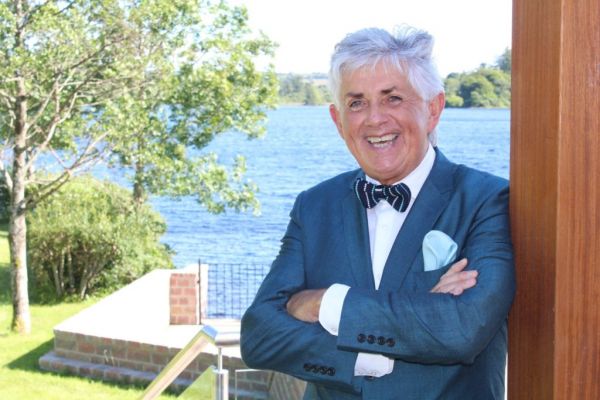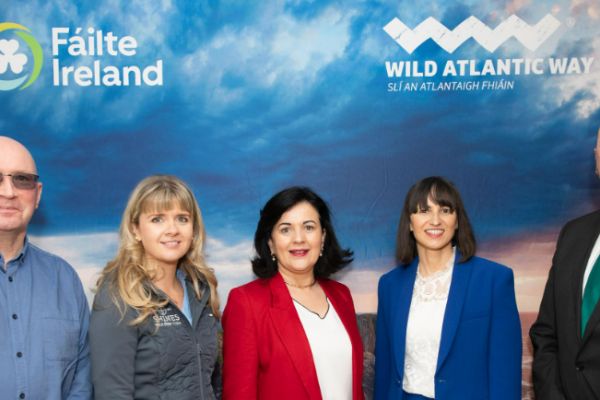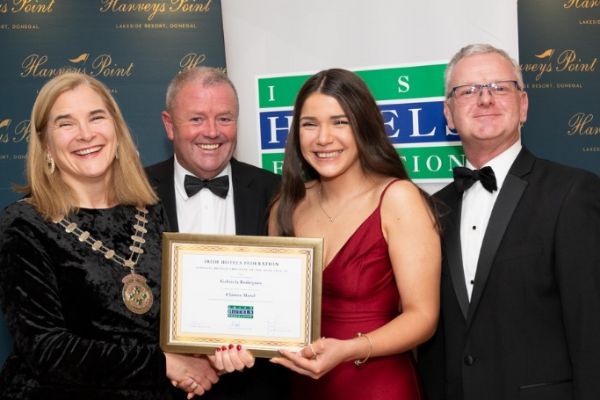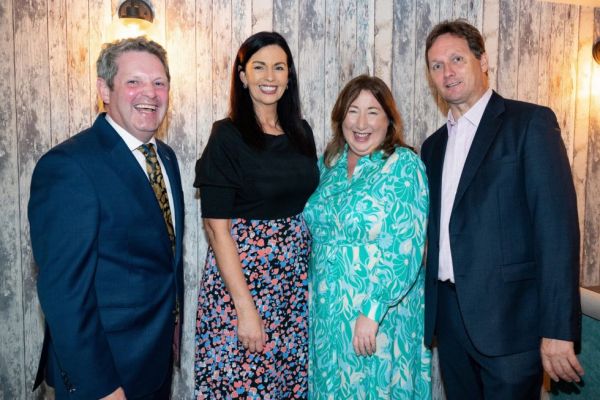Robert McHugh catches up with Noel Cunningham, Hotel Ambassador at Harvey's Point, 'a luxury hotel set in the idyllic surroundings of Lough Eske.'
In recent years, Harvey's Point in Donegal has gone from strength to strength. The four star luxury hotel was named the TripAdvisor 'Number 1 Hotel in Ireland' for the fifth year in a row this year.
In 2021, the TMR Hotel Collection invested €3 million in the property, to add 28 new rooms to the hotel. The investment came after it spent more than €1 million to renovate the hotel’s ballroom in 2019. A further €1.2 million was invested in the hotel during 2022, to complete renovation works on existing hotel rooms.
Noel Cunningham, Harvey's Point's hotel ambassador, who previously worked for several years as the hotel's general manager, has played a huge role in this success.
The proud Donegal man is legendary not only in Harvey's Point but also in the broader hospitality industry for his gregarious personality, hard work ethic and ceaseless energy.
Noel always seems to be on the move, even on his days off. When I originally contacted him for this interview, he was hiking the 'Donegal Camino' in aid of Cancer Care West!!
What was your first job in the hospitality industry, and how did that experience shape your passion and commitment to the field?
My first job was in a little guest house near my home in South Donegal called Fintra House.
It was a legendary place in those days, right on the beach, it mainly had visitors from Ulster in Northern Ireland. It convinced me that hotel life was very like theatre, and it was certainly a people business I wanted to be part of, simple as that.
The whole notion of variety, the new people you meet, the excitement, the drama, the ups and downs. It was just exciting for a young fellow and I knew it was for me.
Who was your first mentor in hospitality, and how did their guidance influence your growth and development as a hospitality professional?
That's a very difficult question.
I have had so many mentors down the years, and so many people that I admired, because I was very fortunate to be offered so many fantastic jobs. I never really had to look for a job ever in my life, it’s one of those peculiar things.
I suppose the person who inspired the most was a man called Matt Buccianti. He was my first general manager in Trust House Forte. He was Italian and he had extraordinary standards. He always put the customer first, nothing compromised his own standards, in terms of the customer is always right.
He went on to great things in in in the company, he was the resident director at the Great Grosvenor House Park Lane for many years and then went out to look after some of the Deluxe properties in the United Arab Emirates.
This was followed closely by a man named Alan Beswick. He was general manager at the Post House Heathrow. It was a time of great excitement because I was deputy manager, and we were the first people to introduce things like putting an integrated computerised system in a large hotel.
We were also the first team to introduce executive rooms because we had over 600 bedrooms based in-corporate and airport-related kind of business. We needed ideas to improve room rates and to give a different kind of perspective on airport hotels.
We started the executive floor with one and then we added another, so we had approximately 80 rooms out at what I called premium.
People went directly to those floors and their registration card was already in their bedroom to fill out at their ease. They got a gin and tonic or a cold beer when they arrived, there were little snacks provided.
It was just a new concept, a new idea, and a lot of people copied it. The old adage that imitation is the most sincere form of flattery rings true. I was very much part of that innovation with computers, executive floors and it really was very exciting.
Throughout your journey, could you walk us through the various roles you have held in your career and the significant lessons you have learned from each experience?
My first real meaty role was a restaurant manager and what I learned there was simple - that the kitchen and the restaurant must be on the same page. The restaurant manager has to build and encourage a very genuine, respectful relationship with the chef, and with all the kitchen because you succeed or not, based on that good communication and respect.
I also learned that in a restaurant the fancy bits and bobs don't take away from the fact, that the key to any good restaurant, is looking after number one - the customer.
Number two is looking after the staff and number three is building up a good relationship with the kitchen.
Number four is to be completely committed to training, in every aspect, because we tend to let training take a second place in everything we do in hospitality.
We never have budget for it. We never give it the respect it's due. That's where we fail I think in hospitality, in general, the training on the floor.
That's why I personally missed the old Cert Schools that we had in Ireland because they taught basic skills - dining room, bar, kitchen that were unmatched.
We are most certainly today feeling the absence of such technical aspects of training and colleges. We have let standards slip in general. It's not as not as sharp as it was back in the 70s and 80s when we had a greater respect for training.
The second job that I had was house manager/deputy general manager and in those roles I would have been entirely responsible for Rooms Division Front Office and Finance.
The money from the huge hotels that I operated in, when straight to the bottom line, so they were key to the success of the hotel. But sometimes, it’s the success of a little kind of division within a big hotel group, because some of the big hotels, in the good times and in the bad times, helped carry some of the other hotels, that might have been more challenged by matters seasonal and geographical.
In my hotels, it was key that we were ultra successful, so I learned the importance of average room rates and maximising that. I also learned the vital role that cleanliness and having a good executive house keeper is in our business, because a clean hotel and spotlessly clean hotel in every area, is something that is so, so, so undervalued in our industry.
I think our house keeping staff should be lauded, praised and encouraged because they have the most difficult job and they have such a key role in maintaining our reputation, in any hotel or any catering or hospitality outlet, we are involved in.
I suppose the lessons I learned from being a general manager, is in a company role, it's not always easy keeping the bosses happy and you have to learn that skill of good communication. That you fight your corner, in terms of wage budgets, budgets for training and budgets for the finer aspects of your standards, and that's a skill in itself.
The entire conversation can’t just be about the bottom line and profit, because the bottom line and the profit will disappear if we're not coming up with the goods, or providing the standard that is demanded with the variety of hotels and outlets that there are in the world today and have been for the last 20-25 years.
We have to be different, and the way to really be different, is to have impeccable standards and that doesn't have to mean gimmicks.
It is the basic standard of the welcome, the service, the cleanliness, and giving the customer what they're paying for.
Which industry networks have you been a part of that have provided vital support and contributed to your career progression?
For any business organisation, from both a business point of view and an entrepreneurial point of view, industry networks are vital.
I remember in the old days, organisations like rotary, brought business. The airline companies and organisations at London Heathrow where very, very, very instrumental in my success because I built up great friendships and relationships, which meant that the business was, you know, very much impacted in a positive way from a sales point of view.
We cannot forget our hotel federations. They are there to support us. The problem is that those who complain that nothing is ever done, or that they're not any good or whatever, are the very people that are not going out of their way to be a very active part of such organisations.
An organisation is as good as the effort that's put into it by the members, and sometimes we can complain about the IHF or other organisations in our industry, but sometimes maybe we should question our own contribution to those organisations.
They are, in my opinion, very important, very vital and overall both positive and helpful.
In your experience, what are the most significant challenges you have faced while working in the hospitality industry, and how did you navigate through them?
The challenge we are facing now is a challenge that has been around forever and that is life/work balance.
It’s not easy. We are an antisocial hours business.
I believe that hoteliers are born, you cannot create them. I believe you can’t teach members of staff to smile if they haven’t got it naturally, and then you have a more difficult task in training and developing them. That’s the kind of business we are in.
It's always been a challenge for me because I want, above all else, for the image of our industry to be one of welcome and fáilte, and the customer is always right.
It’s a difficult industry to be in, in terms of personal relationships and family, because you have to have an understanding partner who will accept that you are going to be an absent father or partner, and that’s the reality of it, because this industry demands a lot.
It’s an industry that perhaps needs now, in view of lessons learned during Covid, to be looked looked at again in a more constructive and scientific way, as to how we can model hospitality going into the years ahead to make it a more attractive and successful model for retaining staff, attracting talent and therefore being more innovative and better overall.
Looking ahead, what are your career goals and aspirations, and how do you envision making a lasting impact in the hospitality sector?
Well, you have a slight problem there, as I retire officially this year.
I am turning 70 and I will retire, but I will remain an ambassador for our beautiful Harvey's Point, I enjoy being a part of that story.
Truth be told, my aspirations for the next five years, will be to bring influence there on the work/life balance within our industry and how that can be improved, in a very real way, without affecting the bottom line or financial success. We need urgently to address certain areas on that field.
My other area of influence will be real life training - operational training, skills training- that we are simply just paying lip service to in so many cases. I’m probably going to be criticised for saying some of those things, but if you are going to criticise what I have said, take a good hard look at your own operation, and tell me hand on heart that every day, every department is getting some on-job training done every single day, 365 days of the year, because sadly to maintain standards and give young people skills, some hopes of advancing in the business, that is what is needed to be done.
The other focus will be for myself to talk to young people, to encourage them to come into our industry highlighting the many, many individual careers that can be under one roof. We don’t always get that message home because in the last 20-30 years, the pinnacle was to be hotel manager.
My way of thinking is that we should be offering salaries that make the job for head chef, front office manager, executive housekeeper – they should all have attractive packages highlighting the fact that they are heads of departments, skilled, and really a career in their own right, with no aspirations for anything else but just to be the best they can be in that position, and have that respect afforded to them.








